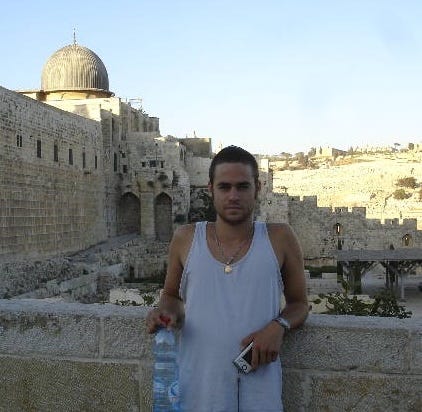
(I think the podcast version of this post is particularly good because of the music so if you have time and space, give it a listen. It’s also available on Spotify, Apple Podcasts etc).
I started this post before Hamas’ massacre of Israelis on October 7, 2023. Just days before the most recent flare-up in this decades-old war, I was taking Yom Kippur seriously for the first time in twenty years.
I started dabbling in Judaism again in late 2022. A friend and his wife would make challah and bring over candles and wine, and we’d celebrate Shabbat. I was rusty. I forgot the prayers and the way things were done. But reconstituting this tradition felt profound and meaningful for us and our young families. We’d sometimes bring friends, and I rather seriously wanted it to be only Jews. This particular desire felt out of character for me. In retrospect, I feel like my nervous system was preparing for a war I didn’t even know was about to happen. I just felt safe in the cocoon of my people.
What kind of Jew am I? I’m the did-a-bar-mitzvah-but-just-memorized-the-Torah-phonetically-rather-than-actually-learning-Hebrew kind; the rich kid kind; the kind of privileged Jew who got a fax from the Prime Minister of Israel on the day of my Bar Mitzvah because my grandfather and he were friends; the type of Jew that doesn’t believe the Holocaust can actually happen again on the same scale; the type of Jew that knows our traumatic past doesn’t disqualify us from committing genocide. I’m the kind of Jew who was raised Zionist, went to Israel multiple times, and was led to view the settlements as a kind of achievement.
After WWII, Jews could have asked for all of Germany to be handed over to us and made into a Jewish state. We probably could have peaceably annexed Minnesota or Arizona. But no, blinded by trauma, we did as Britain and the US wanted and went over there to finish the Holy Wars and lock the Palestinians into a ghetto—the same kind of ghetto the Germans and Italians had put us in just a few decades earlier, all while accusing Palestinians of living in the dark ages.
What’s more Jewish than not being proud of the Jews?
There is an old joke that goes: Two Jews shipwrecked on a desert island. When their rescuers arrived a couple of years later, they discovered the two men had built three synagogues during their isolation. “That one’s mine,” said one man. “That one’s mine,” said the other man. “And what about that one?” asked the rescuer, pointing to a third synagogue.” “Oh,” one man said,” we don’t go in there.”
This joke memorializes the fact that Jews were born to kvetch about one another. So here I go kvetching.
After my bar mitzvah and the odd Hannukah here and there, my Jewishness got washed down the drain of atheism for almost two decades. And then, something I read this year changed that. My friend who would come over for Shabbat had a good shpiel about how the religious aspects aren’t that relevant; God doesn’t even have to be invoked. Instead, it is the sacredness of routinely joining with your friends to break bread and feel humble before one another. It is the traditions that are the religion, not the belief itself. This point of view was so enjoyably counter to my up-until-then unchecked Christian view of Judaism. I thought I had to accept Judaism as my lord and savior. It turns out I don’t; I just have to have dinner with my friends every Friday. Similarly, I thought that Zionism and Judaism were synonyms; that supporting Israel was supporting Jews. Over the past few weeks, I’ve realized that’s a mirage.
My grandfather was a Zionist. After the war (during which he was a Nazi hunter, undercover as a Nazi officer, blew up train tracks, smuggled people, made fake passports, and much more), he stopped believing in God. He said the things he saw made him realize there is no God. He didn’t care about Judaism anymore. But he wanted his brothers and sisters to have a homeland. Until he died, he worked tirelessly to make it happen.
I didn’t realize it until recently, but I was raised under this cynical dogma. I was raised as a godless Zionist.
I’m embarrassed of Zionist Jews because I disapprove of Israel like I disapprove of all colonialism. My beliefs about Israel have nothing to do with Semitism or the Holocaust, or terrorists. I’m simply against colonization in every God-damned form.
If Zionists could defend (or maintain) Israel from an anti-colonialist perspective, I’d have a different stance. But it’s no longer possible. Zionism is unabashed colonialism—they learned it from the British, perhaps the OG colonialists. There is nothing morally sound about marching into someone else’s land with weapons and claiming it is your own. Once you do that, the response of the people who live there is reasonably devoid of any moral constraints. We are quick to call these people terrorists, animals, and savages, but we never admit our role in transforming these humans into what they are today. In America, we were taught in school that the American Indians were savages because they scalped people, but never that the British were savages for literally everything they did and continue to do to native people and their land.
I’ll be the first to admit I need to read about the Israel and Palestine conflict in more objective detail. Leave a comment if you can recommend some good books. All I can say at this point is that Jews have a right to be in Israel, to pray in Israel, and to be a constructive part of the region, but they don’t have the right to maintain it by force; they don’t have the right to be violent Zionists, they don’t have a right to continue this war using foreign money, all while claiming Hamas is somehow corrupt for using Iranian money. This becomes increasingly problematic when you remember that the USA and Britain are directly responsible for the current state of Israel and Iran. The CIA and MI6 overthrew the Persian government in the 50s and gave their new puppet president a million bucks to do their bidding. Since then, it’s been a mad house. A few years later, we helped Iran start a nuclear program, and then decades later, we are using them as a prime example of a nuclear-armed terrorist state. That’s a longer story, but the gist is clear: The whole world is the US and Britain’s stage and it is a shit show. The US and Britain have no interest in peace or democracy.
Given that Jews today have so much power globally, to not be an embarrassment in the history books, we have a responsibility to actually seek peace and only peace. But since the US, UK, and fascist Zionists are steering the ship, that will not be the case. They simply don’t want peace.
In my view, Jews are travelers; the meaning of some rocks in a desert shouldn’t mean anything to us. We have lost our home many times; that’s our story, that’s our brand.
I’m the type of Jew who would rather us be the mystical vagabonds as we have been throughout history—searching for home as a way of life—strong in our diaspora, rather than the supplicants to a Westernized, militarized, and colonizing ethnostate engineered mainly by white, capitalist, Christians.
Yom Kippur is About Your Deathbed
Growing up in Florida and going to a “Catholic-based” school, my understanding of Yom Kippur was about repenting for your sins. But Christian sins are way different than Jewish sins. Jews don’t have hell. Jews don’t even have an afterlife. So, the idea of starving myself all day to avoid going to hell seemed frightening and/or idiotic. I didn’t learn till I was 32 that Jews don’t have hell.
I was in quite the bubble. After the terrorist attacks on 9/11, our writing assignment at school was to write a letter to President Bush thanking him for starting the Iraq war to protect us. Shit like this is what I mean when I say the Zionists learned how to colonize from the British/US. We were made to thank our president for violently invading a country in the Middle East for reasons that were eventually proven completely untrue.
On Yom Kippur, we aren’t just not eating. We don’t eat or drink or clean ourselves or do any “life-affirming activities.” No sex, no kissing, no enjoyment.
We do this to invite death into the room. We do this to remind ourselves death makes everything meaningful, so we make some meaning using this fact. We want to experience the regrets of the death bed.
If you were dying today, to whom and for what would you apologize?
Since you’re not actually dying, and all those people you have to apologize to are not able to be in the same room, you instead apologize to God—aka the forgiving part in each of us. On Yom Kippur, we want to tell God we understand that they see everything, and we promise to be better.
I don’t mean God is watching from above; that’s weird and creepy and anthropomorphizing. God doesn’t have a head. “God sees everything” is just another way of saying “everything exists”— meaning the things you did in secret when no human was watching, those thoughts you had that hurt or helped you, the relationships you keep, the love you have for your family, all of that exists in the same continuum. There is no compartmentalizing when you’re relating to god.
You will die one day, and if you have a moment to think before you do, who would you apologize to? What would you wish you had done differently? Starve yourself for a day, meditate on the weight and reality of death, and let out your grief for the things you have done or dreams you have lost. Awake the next day, grateful to have another chance. So, that’s Yom Kippur, to me at least. Ask God to press the reset button.
It’s the same mechanism in the story of Jesus dying for our sins. That is basically one person, God’s son, holding all the regrets or sins of a people. Jesus was basically acting out Yom Kippur. We are all processing for one another. The Palestinians are today processing with their minds and bodies the grief and shame the Zionists are unable or willing to process.
Even if you’re an atheist, you have to admit that life gets overwhelming and confusing, and you sometimes act in ways you later regret, and those regrets can pile up in our bodies and minds. The idea of God, also known as “relating to everything,” has a convenient offer to hold that regret for us. Think of it as cloud computing for the emotional climates that circulate the Earth and maybe the galaxies.
Instead of feeling like there are people who believe in god and people who don’t, remember that our awareness of God can come and go. It’s a conversation with everything in the universe; it’s both easy and really hard to do. Even atheists like looking out at a beautiful valley sunset and feeling small yet safe, even though there is no empirical reason for this beauty and this comfort. A beautiful valley sunset emits a message: you are held, and there is good in the world.
So that’s what I mean when I talk about God, whatever that feeling is. And this is hard: to talk about God, I don’t even know what his/its/her/their pronouns would be. Marley says God’s pronoun is “we.” She’s probably right. She’s right about nearly everything.
On My Yom Kippur
I only made it to 3 p.m. I got starving and made a turkey sandwich with chips and a coffee. But between sundown the night before and 3 pm, I sat hungry listening to Kol Nidre, the de facto Yom Kippur anthem, on repeat.
I listened to the Itzhak Perlman version but also found the Israeli Defense Force’s version, which feels more relevant now in light of the war. I wonder what was going through their minds as they sang.
This version is also vibey with no words.
Anyway, I sat in a room hungry and listened to this repeatedly while meditating. I would do this for 20 minutes, then do other stuff around the house, and then do this again.
I ate at 3 pm not because I was giving up, but because I was reading a primer book about Yom Kippur, and it’s all about going to Temple and singing all day and being in community. I realized that’s important. It’s way easier to be starving when you’re around other hungry people singing songs all day rather than sitting in a room alone, annoying your family by being smelly and serious. I’m going to join a synagogue and try again next year. Now that we’re living in Portland, hopefully I can find a temple that is also anti-Zionist. I still had some transcendental moments. In my grieving, here are some things that came up in me. Before you read my sorrys, I’m adding two at this moment, based on the past few weeks:
I’m sorry to my grandfather for speaking against Israel. I’m sorry to my Zionist friends for letting this holy war wedge into our love for one another. I do love you. I’m sorry for traveling to Israel and celebrating the settlements.
My heart hangs heavy with the weight of death and grieving moving over the planet right now. I’m sorry this is happening. I’m sorry it’s so painful and sharp. I’m sorry peace is so hard. I’m sorry I’m not more politically active—I’m sorry I don’t use my body in protest. I’m sorry writing is all I know how to do in these moments.
The rest of my regrets went like this:
I’m sorry, first and foremost, to God. For shunning you for so long. For listening to the bullshit on the TV and in the books and in the mouths of godless teachers and friends, whose mouths became my own.
I’m sorry for judging the priests and rabbis and imams for being human rather than actual conduits to you. I’m sorry for letting worldly concerns estrange me from you, severing our relationship. Forgive me for just now beginning to forge a relationship with you in wordless worlds and the limitless nothingness that surrounds us.
I’m sorry to my ex-wife, Michelle, for my being spineless, and being angry at you for not standing in as my spine. I’m sorry for any torment I caused you, and for actions and words that made our separation far more painful than it needed to be.
I’m sorry to my parents, Simon and Diana, for moments of unhinged ungratefulness. For myopic stubbornness, for ever embarrassing you or myself.
I’m sorry to my dogs, Snail Shell and Bergman, for letting myself become so unloving with the growing of my family. I’m sorry for not knowing until recently—as you have probably known all along—that I do have room, time, and resources to love you fully and give you a sweet, safe, and joyful life.
I’m sorry to the many women and perhaps some men I have wooed and romanced unconsciously and indelicately. I’m sorry if I was ever reckless with your hearts.
I’m sorry to my mother-in-law, Mumu, and sister-in-law, Sandee, for ever being impatient with or ungrateful for you.
I’m sorry to my body, which is me, for forgetting your needs, your potential for strength, your joy for dancing, and your spirit for loving.
I’m sorry to my wife, Marley, for ever making things more complicated than they need to be, and for doing things too quickly. And for not being present with you from my heart and my root. I’m sorry my DIY projects usually include me messing something small up and then spending hours fixing it, and then expecting to be applauded for my hard work. I’m sorry if I’ve ever made you feel unwanted. I want you more than anything in the world. I’m sorry for the narcissistic parts of me I let run rampant when I’m feeling alone, scared, or stressed.
I’m sorry to my son Jahji for getting so impatient with you at almost every bedtime. I’m sorry I can only play for 10 minutes before I check my phone. And I’m sorry for not moving immediately to a farm so that you could be present for every step of my day instead of me staring at a computer in the basement while a stranger raises you.
I’m sorry to Coco for threatening to eat you all the time. That must be scary. I’m just pretending. I love you. And I’m sorry for wiping your butt too hard sometimes.
If I were dying today of some horrible wound, these might be the things that come up in my final moments. Even the butthole jokes.
The act of rehearsing your death is so much more powerful than the trope of attending your own funeral—imagine attending your own death. Sitting by your own bedside and taking last rites.
What would your soul weep for? What will your demons lay on the altar? What would you do differently if you had the chance? Who did you have compassion for who you shouldn’t have? Who didn’t you have compassion for who you should have?











